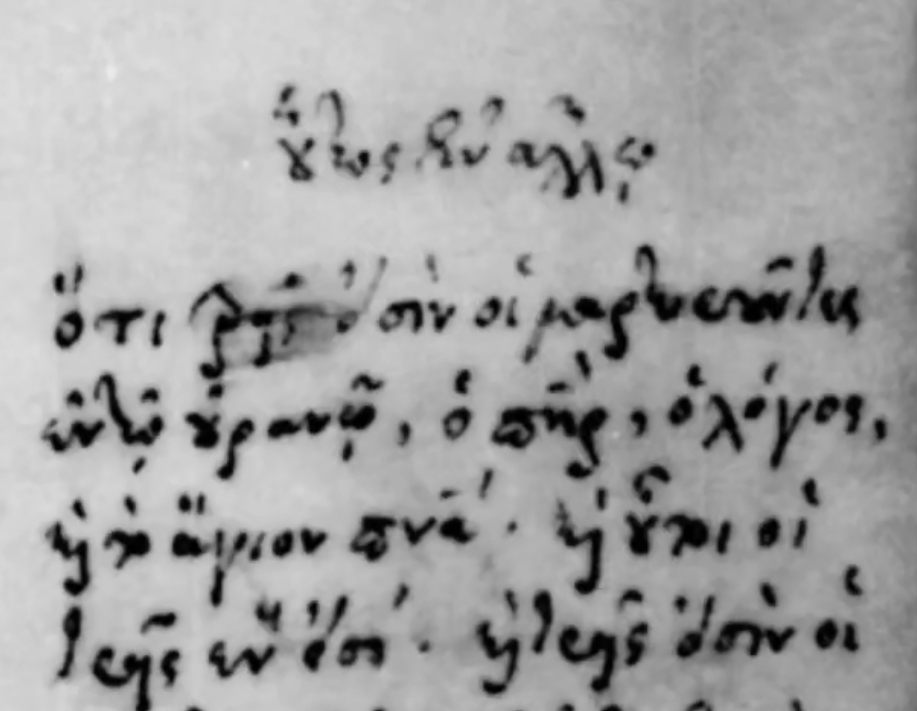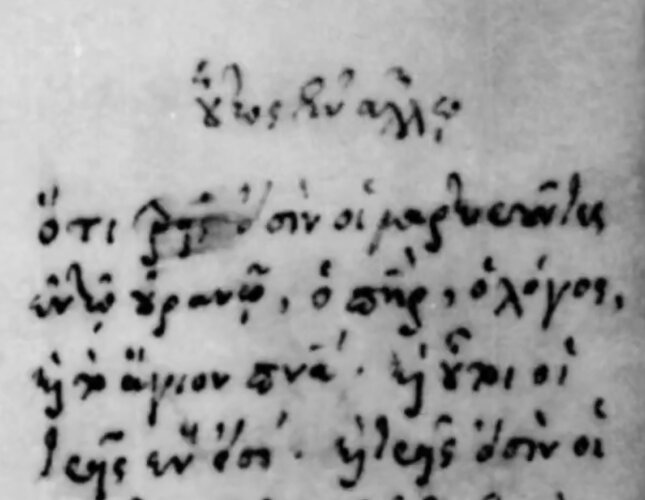childishkillah
BROWNED Corp™ Actor
- Joined
- Sep 25, 2024
- Posts
- 2,865
- Reputation
- 4,205
Whenever people bring up the Trinity in the New Testament, they often point to a passage in the First Letter of John, chapter 5, verses 7 to 8. It’s usually quoted like this:
"For there are three that bear witness in heaven: the Father, the Word, and the Holy Spirit; and these three are one. And there are three that bear witness on earth: the Spirit, the Water, and the Blood; and these three agree as one."
ὅτι τρεῖς εἰσιν οἱ
μαρτυροῦντες ἐν τῷ
οὐρανῷ ὁ πατήρ ὁ
λόγος καὶ τὸ ἅγιον πνεῦμα καὶ οὗτοι οἱ τρεῖς ἕν εἰσιν
At first glance, this sounds like the clearest reference to the Trinity in the whole Bible. But the truth is that this text was never part of the original letter. Scholars call this addition the Comma Johanneum, which is just a fancy name for a sentence someone inserted later on.
If you look at the earliest Greek manuscripts, you can see it doesn’t belong there. For example:
Codex Sinaiticus, from the 4th century, doesn’t mention the Father, the Word, or the Holy Spirit giving witness in heaven. This section is completely missing.
Codex Vaticanus, also from the 4th century, doesn’t have it either. The place where it would be is simply blank.
In the rare Greek manuscripts where it does appear like Minuscule 221, written more than a thousand years after the original it shows up only in the margin. Someone added it by hand much later.
It’s obvious that this passage is not authentic, but was put in to support the idea of the Trinity, which was controversial and far from universally accepted in the early church. The honest thing for modern Bible publishers would be to clearly note that this sentence is a later addition, or simply remove it so people aren’t misled.
This example shows something deeper: the Christian scriptures have not been well preserved . Verses have been added, changed, or left out over the centuries. This is exactly what the Qur’an warns about. In the second chapter Al-Baqarah, verse 79.
فَوَيْلٌ لِّلَّذِينَ يَكْتُبُونَ الْكِتَابَ بِأَيْدِيهِمْ ثُمَّ يَقُولُونَ هَـٰذَا مِنْ عِندِ اللَّهِ لِيَشْتَرُوا بِهِ ثَمَنًا قَلِيلًا ۖ فَوَيْلٌ لَّهُم مِّمَّا كَتَبَتْ أَيْدِيهِمْ وَوَيْلٌ لَّهُم مِّمَّا يَكْسِبُونَ
"Woe to those who write the Book with their own hands and then say, “This is from God,” so they can sell it for a small price. Woe to them for what their hands have written, and woe to them for what they earn."
The Comma Johanneum is a perfect example—people wrote it in and claimed it came from God.
As for the Trinity itself, it’s an idea that doesn’t fit with the pure monotheism taught by the prophets. Jesus never clearly said he was God, nor did he preach that God is three persons. Only HUMANS, church leaders built up complex arguments and forced this doctrine into Christian belief. But no matter how many councils or debates tried to justify it, the concept remains a human invention, not a divine truth.
In the end, this passage doesn’t prove the Trinity. Instead, it shows how far some people were willing to go to defend a teaching that was never part of the original message.
"For there are three that bear witness in heaven: the Father, the Word, and the Holy Spirit; and these three are one. And there are three that bear witness on earth: the Spirit, the Water, and the Blood; and these three agree as one."
ὅτι τρεῖς εἰσιν οἱ
μαρτυροῦντες ἐν τῷ
οὐρανῷ ὁ πατήρ ὁ
λόγος καὶ τὸ ἅγιον πνεῦμα καὶ οὗτοι οἱ τρεῖς ἕν εἰσιν
At first glance, this sounds like the clearest reference to the Trinity in the whole Bible. But the truth is that this text was never part of the original letter. Scholars call this addition the Comma Johanneum, which is just a fancy name for a sentence someone inserted later on.
If you look at the earliest Greek manuscripts, you can see it doesn’t belong there. For example:
Codex Sinaiticus, from the 4th century, doesn’t mention the Father, the Word, or the Holy Spirit giving witness in heaven. This section is completely missing.
Codex Vaticanus, also from the 4th century, doesn’t have it either. The place where it would be is simply blank.
In the rare Greek manuscripts where it does appear like Minuscule 221, written more than a thousand years after the original it shows up only in the margin. Someone added it by hand much later.
It’s obvious that this passage is not authentic, but was put in to support the idea of the Trinity, which was controversial and far from universally accepted in the early church. The honest thing for modern Bible publishers would be to clearly note that this sentence is a later addition, or simply remove it so people aren’t misled.
This example shows something deeper: the Christian scriptures have not been well preserved . Verses have been added, changed, or left out over the centuries. This is exactly what the Qur’an warns about. In the second chapter Al-Baqarah, verse 79.
فَوَيْلٌ لِّلَّذِينَ يَكْتُبُونَ الْكِتَابَ بِأَيْدِيهِمْ ثُمَّ يَقُولُونَ هَـٰذَا مِنْ عِندِ اللَّهِ لِيَشْتَرُوا بِهِ ثَمَنًا قَلِيلًا ۖ فَوَيْلٌ لَّهُم مِّمَّا كَتَبَتْ أَيْدِيهِمْ وَوَيْلٌ لَّهُم مِّمَّا يَكْسِبُونَ
"Woe to those who write the Book with their own hands and then say, “This is from God,” so they can sell it for a small price. Woe to them for what their hands have written, and woe to them for what they earn."
The Comma Johanneum is a perfect example—people wrote it in and claimed it came from God.
As for the Trinity itself, it’s an idea that doesn’t fit with the pure monotheism taught by the prophets. Jesus never clearly said he was God, nor did he preach that God is three persons. Only HUMANS, church leaders built up complex arguments and forced this doctrine into Christian belief. But no matter how many councils or debates tried to justify it, the concept remains a human invention, not a divine truth.
In the end, this passage doesn’t prove the Trinity. Instead, it shows how far some people were willing to go to defend a teaching that was never part of the original message.




